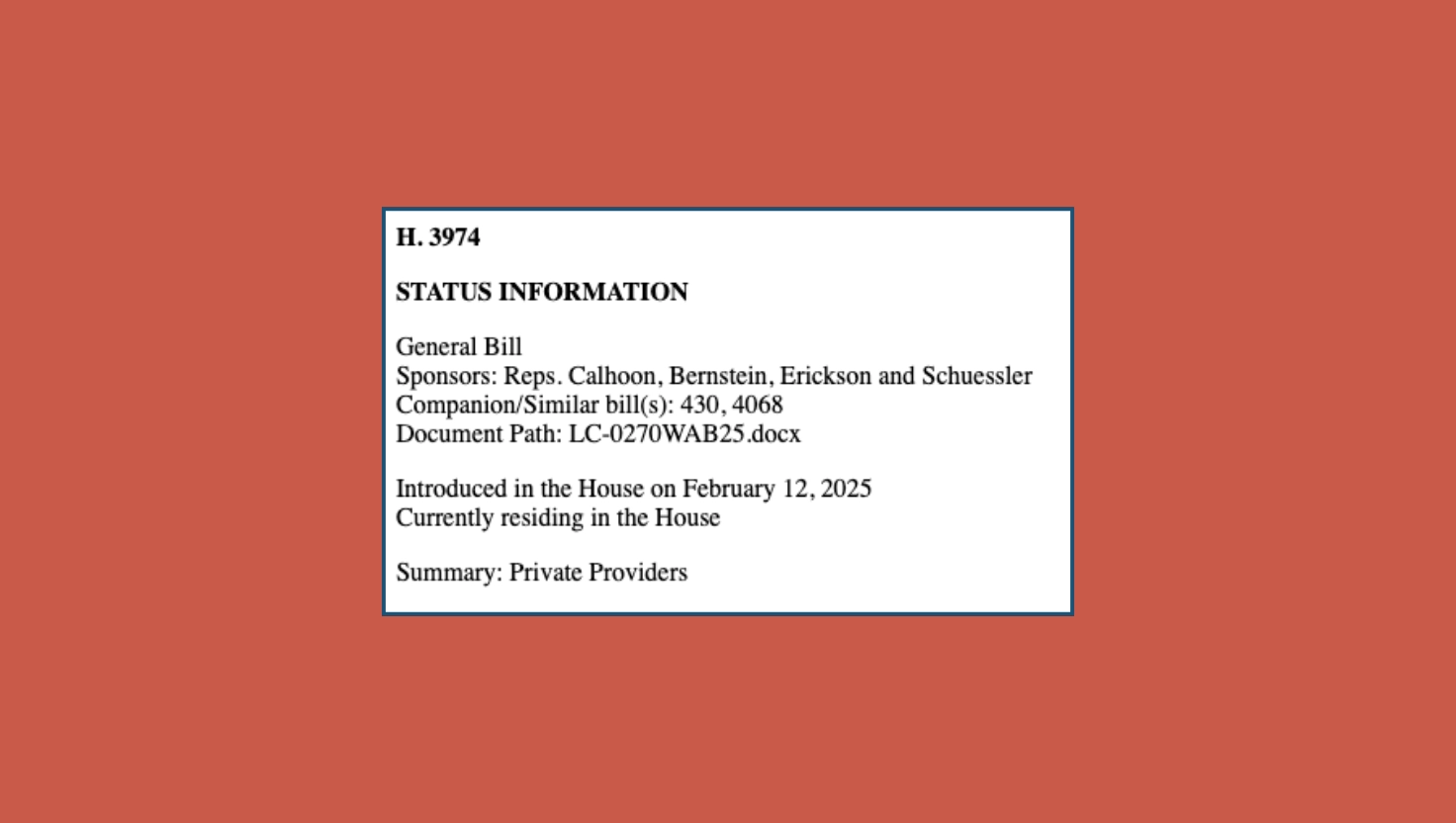H3974 “Private Providers”
Potential and Implications
Recently introduced in the South Carolina House of Representatives and sponsored, as of this writing, by Calhoon, Bernstein, Erickson, and Schuessler, this bill is full of red flags.
One question must be asked repeatedly. “Why is the State codifying and standardizing every detail regarding what is to happen in every school building?” This detail and the growing control from the state and federal levels, extending far beyond basic education and associated activities, should be of grave concern to every parent and taxpayer. Local districts, parents, as well as the general populace, are freely forfeiting any autonomy over what should be highly personal and protected rights and the freedom to determine our own individual choices and destiny. A desire for autonomy and freedom must resurrected.
Three top concerns are:
(1) A Giant Step forward toward Schools as Providers for Services Beyond Their Reasonable Scope
This bill further expands the umbrella of services that will be offered at a child’s local school if this scope of services has not already been established in any district.
This key strategy, which has been in place for decades enabling growing state control and invasion into our lives, is “the impact…on the student’s educational program.” (Section 59-10-510 (1)(e) We must watch out for that kind of persuasive jargon. EVERYTHING can be presented as impacting the education of students. This is the gateway for the State to justify and convince an unwitting population to relinquish all semblance of parental rights and responsibilities.
Establishing centralized, government-run centers where parents may expect every need of their children to be met will simplify the logistics of total control, destroy alternative solutions, and allow the State to raise all children. Locations for all services for child-rearing will be government-run schools. Given other initiatives being established, including “school choice,” that paradigm will soon encompass any educational facility serving Kindergarten through Grade 12. The dwindling role parents are taking in the oversight, determination of, and control of what is happening to their children in their formative years is frightening. “Parental responsibility” is being subtly undermined, discouraged and eventually will disappear. Parental rights will become irrelevant.
(2) Complete Compliance with Federal Laws—That Far too Few Legislators or Educators, (or Anyone Else) Understand or Have Actually Read
The lure of money and the unwillingness to stand up for state sovereignty or autonomy are strong motivators for blindly kowtowing to all federal edicts, even those that are blatantly un-constitutional. Decades of compliance and willingness to avoid personal, local or even state responsibility have given our culture the idea that doing what we are told is a good idea. Federal law defines and mandates the financial responsibilities of school districts in meeting the costs of services the districts must provide.
(3) The Reality of Parental “Requests”
Having personal experience as a special education teacher and administrator, chairing and participating in thousands of meetings over many years, the following phrase in the bill summary grabbed my attention. “…TO SPECIFY THESE EVALUATIONS AND SERVICES ONLY MAY OCCUR UPON REQUEST OF THE PARENT OR GUARDIAN OF THE STUDENT….”
This is clearly an attempt to pre-empt any idea that anything would ever be done without giving the parents complete control and final authority. The rights of parents to make the final decisions about their own children are ostensibly being recognized.
However, the system doesn’t quite work that way. Typically school personnel bring their concerns to the parents’ attention. They invite parents for a meeting, express their concerns, build rapport as best they can, offer helpful solutions, suggest providers the parents may choose for testing or services, and otherwise take subtle control of the process. It is extremely rare to have a parent reply, “Thank you. I’ll take care of it.” Trust and dependence on the school, as well as the parent’s insecurity about addressing the issue, are often too compelling for a parent to refuse free help. Even if a parent advocate attends, with the help of federal law schools implement the process and take control.
Imagine the scenario. The parent(s) walks into a room filled with educational specialists and often any number of trained “specialists,” such as those listed in H3974. The setting is intimidating and puts the parent at a disadvantage. Such concern for their child often results in the parents’ relief that someone will take care of everything. Getting a parent to willing sign permission for whatever testing, evaluations, etc. are recommended is rarely difficult. This is the real meaning of “…upon request of the parent.” Once the school personnel present their information, almost all parents are eager to “request” the services being offered. They are allowed a time period in which to consider the recommendations, but generally permission for all recommended services or testing is signed before the meeting ends.
The goal of the government school system is to have control of the setting, the use of the provider they recommend, free access to the results, the “solution,” and a host of other pieces of what may be a complex interaction with the child. The process is efficient and almost always successful. Parents effectively assume a minor role.
Who picks up the cost?
Many of these services, interventions, and evaluations are very costly. Few parents have the resources for such analysis and support for their child. Taxpayers foot the bill. There is essentially no wiggle room for cost-sharing or other options to prevent the taxpayers from assuming most or all of these expensive actions, especially under federal law.
What Could Go Wrong?
It could be argued that the most powerful way to influence and control people is through emotional manipulation. Whether that involves addressing behavioral, psychological or emotional disturbances, the opportunities in these realms may be at least as potent as straight mind-manipulation and control (see H3264 for an example of that). Schools are gaining immense influence over the social-emotional development of children, in the unnatural setting of a school, too often effectively removed from the influence of their natural parents.
Society is moving toward centralized control in many forms. People are also confused by the “benefits” of efficiency—everything in one place with options offered by the government. It’s easy, but what are we giving up? Could it be we are giving up our freedom, autonomy, rights and responsibilities—everything that will matter, including the our children?
One More Thought
Special Education is a field that attracts those with compassion and the willingness to address the most difficult challenges in education. It still contains many of those people. However, laws regarding special education, from the federal level in particular, including those listed in H3974, have become powerful tools for introducing dangerous practices impacting every school. These practices come with the appearance of beneficence that entraps the emotions and compliance of many people. This allows those with nefarious intent to slip in disguised controls that are dangerous to all students. An example of this is Act 213 of the SC Code of Law, slipping in social-emotional learning behind an initiative presented as a means to “help” children with dyslexia.
It is time to pay attention.
After starting to home school her own children in the mid 1970s, Meg Johnson was recognized nationally and internationally as a home schooling pioneer and leader. She holds advanced degrees in education, has been a school teacher and administrator, is a published author, speaker and advocate for home schooling and parental rights. She was accepted for inclusion in multiple “Who’s Who” volumes of international leaders in the 1980s. Her deep understanding of the concepts of freedom, responsibility, rights, and the dangers of the administrative state provide her with a sound perspective on the dangers we face from our government today.
Disclaimer: The views expressed in this article are those of the author and do not constitute legal or professional advice. ConservaTruth assumes no liability for any actions taken based on this content. Read more.

Subscribe to ConservaTruth's Email Newsletter for curated insights on South Carolina's legislative activities and conservative viewpoints, delivered straight to your inbox! With vetted and easy-to-understand information, our newsletter empowers you to become an informed and engaged citizen, actively participating in safeguarding our cherished Constitutional values. Don’t miss out on crucial updates—join our community of informed conservatives today





Comments